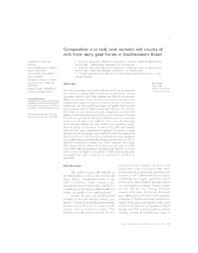Composition and bulk tank somatic cell counts of milk from dairy goat herds in Southeastern Brazil.
Composition and bulk tank somatic cell counts of milk from dairy goat herds in Southeastern Brazil.
Autoria: SOUZA, G. N. de; BRITO, J. R. F.; BRITO, M. A. V. P. e; LANGE, C. C.; FARIA, C. G. de; MORAES, L. C. D. de; FONSECA, R. G.; SILVA, Y. de A.
Resumo: The milk composition and somatic cell count (SCC) are requirements for assessment milk quality and mastitis in goat herds. Studies conducted with dairy goat herds indicated that the milk composition differed among them to due to factors such as genetic, feeding, system of production, stage of lactation, year and year-season. The objective of this study was to assess SCC and other milk quality indicators (fat, protein, lactose, and total solids) for goat milk bulk tank. The influence of the herd and year-season on the milk composition as well as herd, milking system and year-season on SCC was also evaluated. Thirteen Brazilian dairy goat herds with about 1,400 dairy goats were included in the study. Six herds were milked by hand and in the remaining seven machine milking was used. Herds were sampled at weekly intervals during two lactations. A total of 913 bulk milk samples were analysed using a automated equipment. The general average percent values for fat, protein, lactose and total solids were, respectively, 3.44, 2.95, 4.45 and 11.69. The effect of herd and season was significant for all milk components and bulk milk goat somatic cell count (SCC). The SCC average of all 13 herds was 779,000 cells/ml. The average SCC values of herds milked by hand and by machine were 1,121,000 and 848,000 cells/ml respectively. In both groups, the SCC was lower in the winter and higher in the autumn. Herd characteristics were responsible for higher variability on components and SCC in goat herds.
Ano de publicação: 2009
Tipo de publicação: Artigo de periódico
Unidade: Embrapa Gado de Leite
Palavras-chave: goat milk, milk composition, somatic cell count
Observações
1 - Por padrão são exibidas publicações dos últimos 20 anos. Para encontrar publicações mais antigas, configure o filtro ano de publicação, colocando o ano a partir do qual você deseja encontrar publicações. O filtro está na coluna da esquerda na busca acima.
2 - Para ler algumas publicações da Embrapa (apenas as que estão em formato ePub), é necessário ter, no celular ou computador, um desses softwares gratuitos. Sistemas Android: Google Play Livros; IOS: iBooks; Windows e Linux: software Calibre.
Acesse outras publicações
Acesse a Base de Dados da Pesquisa Agropecuária (BDPA) para consultar o acervo completo das bibliotecas da Embrapa.

